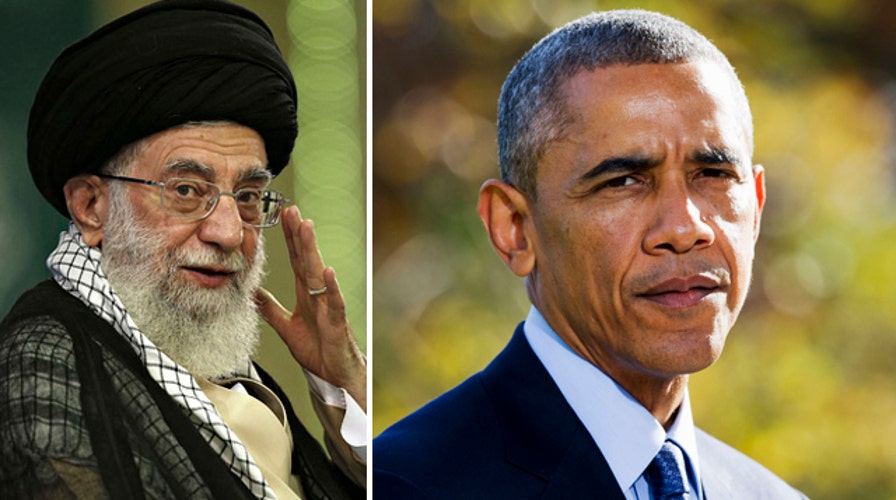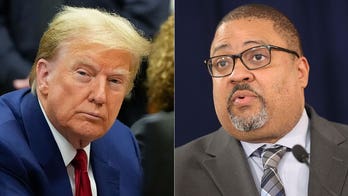Inside the politics behind Obama's letter to Iran Ayatollah
KT McFarland reacts to report that president penned secret letter on fighting ISIS
WASHINGTON – President Obama, taking diplomacy into his own hands with his "dear Ayatollah" letter to Iran's Supreme Leader, is drawing a seismic response on Capitol Hill.
"It is outrageous that, while the cries of moderate Syrian forces for greater U.S. assistance fall on deaf ears in the White House, President Obama is apparently urging Ayatollah Khamenei to join the fight against ISIS," GOP Sens. John McCain of Arizona and Lindsey Graham of South Carolina said in a joint statement.
The Associated Press confirmed the existence of the letter, first reported by The Wall Street Journal on Thursday. According to the Journal, Obama wrote to Khamenei last month stressing their shared interest in confronting the Islamic State -- and tying cooperation on that front to a deal over Iran's nuclear program.
The U.S., Iran and other negotiators are facing a Nov. 24 deadline for such a deal.
But McCain and Graham noted Iran is fueling the violence by backing radical militias in Iraq and "doing everything in its power to aid the killing machine of Bashar al-Assad in Syria."
They warned: “The consequences of this ill-conceived bargain would destroy the Syrians’ last, best chance to live in freedom from the brutal Assad regime.”
A congressional source also told Fox News that the letter would upset the inroads they've tried to make with "the Sunni league," noting that the president should have informed Congress of this back-channel if it was in fact going on.
"This f***s up everything," the source said. Iran's government is Shiite-led, while the Islamic State is a Sunni terror group. The source was apparently referring to efforts to rally support among Sunni-led Arab states to confront ISIS.
Iran is not part of the U.S. coalition, but it has also been fighting the Islamic State on the ground. However, Iran's interests in pursuing the Islamic State's defeat differ from those of the Obama administration. Iran is a staunch supporter of Assad, who is a target of the militants and opposed by the U.S.
Echoing the claims a day earlier from the chief White House spokesman, National Security Adviser Susan Rice on Friday would not comment on "potential presidential correspondence."
However, she said the U.S. policy has not changed, and the U.S. is "in no way engaged in any coordination, military coordination with Iran on countering ISIL."
She also said there is "no linkage" between that issue and the nuclear negotiations, calling reports to the contrary "inaccurate."
House Intelligence Committee Chairman Rep. Mike Rogers, R-Mich, called the letter “really concerning,” on Friday, adding that it might hurt fragile U.S. alliances in the Middle East.
“I can tell you that it is causing real problems with our Sunni Arab League partners in the fight against ISIS,” Rogers said Friday on MSNBC. “It’s really concerning.”
Some, though, say it’s too soon to judge why Obama sent the letter and the possible consequences.
“Before we pass judgment on the president’s choice, we need to consider why he made this judgment and why now,” Gillian Turner, former staff member of the National Security Council under Presidents George W. Bush and Bill Clinton, told Fox News.
Turner believes the dynamic with Iran has changed over the past year, especially with ISIS merging as a common enemy in the region.
“You’re right to say the president needs to be mindful of the legislative branch but at the same time the president is in a unique position,” she said.
U.S. officials have not ruled out the possibility that a nuclear accord with Iran could open the door to discussions on other issues, but they have sought to keep the delicate negotiations focused solely on Tehran's disputed nuclear program. The U.S. and its negotiating partners worry Iran is pursuing a bomb, while Iran says its nuclear program is for peaceful purposes.
According to the report in the Wall Street Journal, Obama has written to Iran's leader four times since taking office.
The Associated Press contributed to this report.





